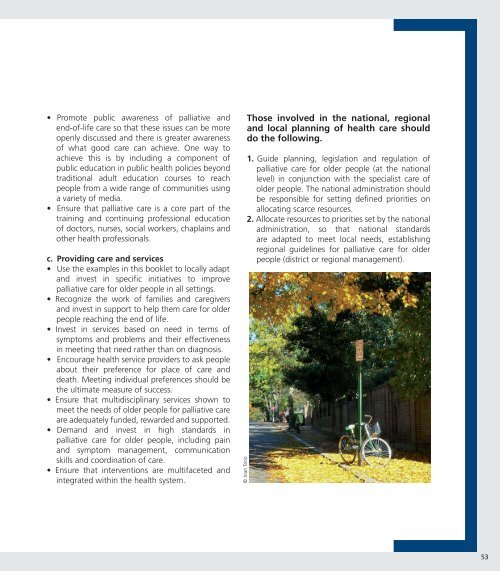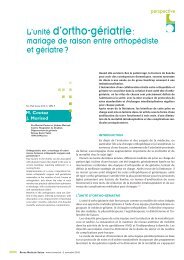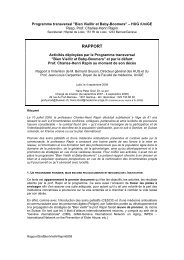Palliative care for older people - World Health Organization ...
Palliative care for older people - World Health Organization ...
Palliative care for older people - World Health Organization ...
Create successful ePaper yourself
Turn your PDF publications into a flip-book with our unique Google optimized e-Paper software.
• Promote public awareness of palliative andend-of-life <strong>care</strong> so that these issues can be moreopenly discussed and there is greater awarenessof what good <strong>care</strong> can achieve. One way toachieve this is by including a component ofpublic education in public health policies beyondtraditional adult education courses to reach<strong>people</strong> from a wide range of communities usinga variety of media.• Ensure that palliative <strong>care</strong> is a core part of thetraining and continuing professional educationof doctors, nurses, social workers, chaplains andother health professionals.c. Providing <strong>care</strong> and services• Use the examples in this booklet to locally adaptand invest in specific initiatives to improvepalliative <strong>care</strong> <strong>for</strong> <strong>older</strong> <strong>people</strong> in all settings.• Recognize the work of families and <strong>care</strong>giversand invest in support to help them <strong>care</strong> <strong>for</strong> <strong>older</strong><strong>people</strong> reaching the end of life.• Invest in services based on need in terms ofsymptoms and problems and their effectivenessin meeting that need rather than on diagnosis.• Encourage health service providers to ask <strong>people</strong>about their preference <strong>for</strong> place of <strong>care</strong> anddeath. Meeting individual preferences should bethe ultimate measure of success.• Ensure that multidisciplinary services shown tomeet the needs of <strong>older</strong> <strong>people</strong> <strong>for</strong> palliative <strong>care</strong>are adequately funded, rewarded and supported.• Demand and invest in high standards inpalliative <strong>care</strong> <strong>for</strong> <strong>older</strong> <strong>people</strong>, including painand symptom management, communicationskills and coordination of <strong>care</strong>.• Ensure that interventions are multifaceted andintegrated within the health system.© Joan TenoThose involved in the national, regionaland local planning of health <strong>care</strong> shoulddo the following.1. Guide planning, legislation and regulation ofpalliative <strong>care</strong> <strong>for</strong> <strong>older</strong> <strong>people</strong> (at the nationallevel) in conjunction with the specialist <strong>care</strong> of<strong>older</strong> <strong>people</strong>. The national administration shouldbe responsible <strong>for</strong> setting defined priorities onallocating scarce resources.2. Allocate resources to priorities set by the nationaladministration, so that national standardsare adapted to meet local needs, establishingregional guidelines <strong>for</strong> palliative <strong>care</strong> <strong>for</strong> <strong>older</strong><strong>people</strong> (district or regional management).53
















